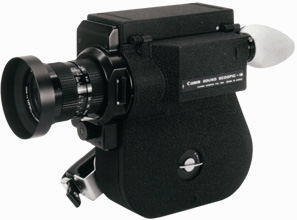 Japan
Japan Americas
Americas Europe, Asia, Oceania
Europe, Asia, Oceania
- Outline
- Specifications
| Marketed | October 1970 |
| Original Price | indistinct |
We received a request from the NHK Technical Research Laboratory to develop a 16 mm movie camera equipped with a simultaneous sound recording mechanism. This is the first 16 mm movie camera in Japan equipped with a simultaneous sound recording mechanism that we commercialized after various product testing in many locations.
We started research in 1963 and commercialized this movie camera in 1970 after camera field tests had been performed by NHK cameramen and by a South Pole research and observation team.
That same year a mountain climbing team that reached the summit of Mt. Everest praised the camera as the only piece of equipment taken on the climb that was without even one defect.
The main mechanism of the Scoopic 16 was a magnetic head that recorded sound on 100 feet of magnetically coated film reeled around a sound drum inside the camera. A sound amplifier, a separate mechanism carried on the shoulder, was connected to the camera by a cable. For light to be guided to a view finder, the Sound Scoopic 100 adopted the mirror shutter with no loss of light whereas the Scoopic 16 that was launched in 1965 used a half-mirror. The EE mechanism also employed the TTL light metering method that guided the light to the CdS photocell through the half-mirror.
| Type | 16mm movie camera with simultaneous sound recording (single system) | |
| Image Size | 10.26 x 7.49 mm | |
| Film | 30.5 m (100 ft.) of 16 mm, single perforated, magnetic coated film | |
| Lens | Focal Length/Speed | 12.5 to 75 mm f/2.5 (17 elements in 12 groups including 5 new type glass element) |
| Zooming Ratio | 6:1 | |
| Focusing | Manual(Front-element focusing) 1.5 m to infinity | |
| Zooming | Manual (lever attached) | |
| Filter | Gelatin filter inserted into the photo lens path | |
| Front Thread Diameter | 62 mm | |
| Viewfinder | Type | Single-lens reflex using mirror shutter (eyepiece rotates) |
| Rangefinder | None (focusing done with overall matte focusing glass) | |
| Dioptric Adjustment | -4 to +2 diopters (eyesight fixture ring attached) | |
| Information | Aperture value, metering needle, over/under exposure warning marks, manual aperture mark | |
| Eyepiece Shutter | Built-in | |
| Exposure Control | Type | TTL method, completely automatic Electric Eye system that employs a light-sensitive CdS photo cell and servo circuit with response time approx. 1 sec. in the range f/2.5 to f/22 |
| Metering Range | ISO 640 f/2.5 24 fps. to ISO 20 f/22 24 fps. | |
| Film Speed | ISO 20 to 640 (1/3-stop increments) | |
| Aperture Adjustment | Manual ring adjustment possible from f/2.5 to f/22 | |
| Aperture Opening Button | Focus adjustment | |
| Film Drive | Type | Electromotive film feed by a built-in mini-servomotor controlled by electronic governor (used jointly with registration pin), manual feed button provided |
| Film Loading | 2-method side loading, with sound or silent | |
| Filming Speed | 24 fps. | |
| Image Stability | Within 01.5% vertically, within 0.1% horizontally | |
| Power Source | Provided in the sound recorder amplifier | |
| Battery Life | 15 rolls at 100-ft each (normal temperature), 3 rolls at 100-ft. each at –20°C. | |
| Footage Counter | Footage count with a 5-ft. scale, automatically returns to “S” every time side cover is opened | |
| Battery Checker | Button press mini-meter display on the recorder amplifier | |
| Shutter | Shutter Opening | 135 degrees |
| Mirror Shake Button | Provided (to fine adjust the position of the mirror shutter) | |
| Sound Recording System | Method | Current bias magnetic sound recording system |
| Bias Waveform | 61 KHz | |
| Other | Distance between shooting aperture and sound recording head: 28 frames Recording head and playback head of the monitor can be removed together as one unit |
|
| Wow/Flutter | Within 0.2% (WRMS) | |
| Sockets | Amplifier connection point | |
| Grip | Fixed hand-grip with hand strap provided | |
| Tripod Socket | 2 types: CU1/4, CU3/8 | |
| Working Temperature Range | -20°C to +50°C | |
| Dimensions (W x H x D) | 133 x 241 x 307 mm | |
| Weight | 5,000 g | |
| [ Sound Recorder Amplifier ] | ||
| Recording Waveform Characteristics | 150 to 8000 Hz –2 dB | |
| Recording S/N | 45 dB or more | |
| Distortion | Max. 3% | |
| Other Recording Characteristics | SMPTE Standard | |
| Recording Volume Adjustment | Automatic (AGC), manual adjustment possible | |
| Microphone | Single-direction (Sanken MU-2), input impedance: 600 ohm balance | |
| Monitor | Crystal earphone | |
| Power Source | Hermetically sealed Ni-Cd battery 24V 1.5Ah (10 hour capacity) Recharge time: 5 hours at normal temperature Power supply for both camera drive and amplifier Amplifier and battery checker share same level meter |
|
| Dimensions (W x H x D) | 63 x 157 x 190 mm Power supply component: 59.5 x 89.5 x 183 mm |
|
| Weight | 3,000 g | |


